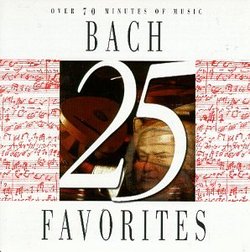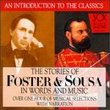| All Artists: Hildegard Rutgers, Johann Sebastian Bach, Karel Brazda, Günter Kehr, Helmuth Rilling, Jörg Faerber, Barry Faldner, Valentin Radu, Chicago Symphony Brass, Mainz Chamber Orchestra, Württemberg Chamber Orchestra, Martin Galling, Nicole Hostettler, Christiane Jaccottet, Christine Sartoretti, Leonore Klinckerfuss, Leonore Klinkerfuss, Philharmonia Slavonica, Figuralchor der Gedächtniskirche Stuttgart, Stuttgart Bach Collegium Orchestra Title: 25 Bach Favorites Members Wishing: 0 Total Copies: 0 Label: Vox (Classical) Release Date: 8/20/1996 Album Type: Original recording reissued, Original recording remastered Genre: Classical Styles: Chamber Music, Forms & Genres, Concertos, Inventions, Preludes, Suites, Historical Periods, Baroque (c.1600-1750), Modern, 20th, & 21st Century, Instruments, Keyboard, Strings, Sacred & Religious, Symphonies Number of Discs: 1 SwapaCD Credits: 1 UPC: 047163881725 |
Search - Hildegard Rutgers, Johann Sebastian Bach, Karel Brazda :: 25 Bach Favorites
 | Hildegard Rutgers, Johann Sebastian Bach, Karel Brazda 25 Bach Favorites Genre: Classical
|
Larger Image |
CD DetailsSimilarly Requested CDs
|
CD ReviewsExcellent for a Beginner Deedlespeaker | 07/26/2004 (4 out of 5 stars) "If you are just entering the realm of Classical music and want to get a good sample of the variety of music J.S. Bach created, this is an excellent first album. The price tag ensures you won't break the bank, and the quality of the recordings is acceptable for a discriminating listener. The album contains a wide variety of pieces that range from lively to somber, playful to majestic, and simple to complex. I rated the album four stars because as it states on the case, the tracks have been "edited" for easy listening.. in that they are either just movements from an entire work, or shortened. (The pieces do not cut off abruptly.) Even so, I found this to be a great introductory album." Back To Bach: 25 Smash Hits Rudy Avila | Lennox, Ca United States | 02/23/2004 (5 out of 5 stars) "Johann Sebastian Bach, without a doubt in any music scholar's mind, was the greatest composer of the Baroque Period. His flair for instrumental music was rich, melodic and grand. He mastered everything that could possibly be mastered as far as Baroque musical convention- except for opera. Had Bach also taken an interest in writing music for operas, like George Frederic Handel did, he would have gone above and beyond. This collection is affordable and offers you 25 of his musical works that best depicts his style. The compilation album is one in the many series of "25 Favorites". Others include 25 Handel favorites, 25 Vivaldi Favorites, 25 Mozart Favorites, 25 Beethoven favorites, 25 Tchaikovsky favorites, 25 Dance Favorites and 25 Opera Favorites.The album opens with the famous Toccata And Fugue In D Minor, originally a work for the organ. It was later re-made into a work for full orchestra. The conductor Leopold Stokowski popularized the music in Disney's Fantasia 1940. The "evil" sound of the ominous organ, particularily the opening toccata, was featured in the original 1930's "Dracula". It is still regarded as a sort of Halloween anthem. The toccata, strongly accented, is followed by a lyrical fugue which he builds on later to a dramatic crescendo and finale. This was Bach's specialty- counterpoint; many melodies being played at once. Also worth noticing is that Baroque music always ended in a decidely dramatic major chord because it was thought to really be the right way to end a piece of music. Bach could never imagine closing his music in pianissimo or a minor chord because it would seem unfinished. The rest of this album features Bach's Brandenburg concerti excerpts, Organ Prelude, Well-Tempered Clavier keyboard music, works for chorus Magnificat and Mass in B, Violin Concertos 1 and 2 and Harpsichord concertos. The Mainz Chamber Orchestra, which is mostly featured on here, may not be the most talented or perfect Baroque performers, but they do deliver a splendid job. If anything, this cd should get you hooked into Bach." Bach Rudy Avila | 08/27/2006 (5 out of 5 stars) "Surely you don't need me to review the guy. You know who he is, you've heard his music, and I hope you own some. So let me turn the podium over to a cat named Picasso, and you can read into that whatever you wish. She's in a chair, near the CD player. She has entered the room specifically for the music. Her eyes are squinted, almost but not quite shut, little face concentrating on just how contented those sounds make her feel. Nobody can say why they move her so, any more than we can say why they move us so. If we knew the answer to that one, we'd copy the guy. But anyway, she loves the music, and don't you dare make a sound such as squeaking your computer chair. If you do, her golden orbs will open, fix upon your face, and shame you. Yes they will. But if you are quiet long enough, you can watch a little calico sleep, with the very same sweet kitten face that drew you to her five years ago. Bach is gooooood.
" |

 Track Listings (25) - Disc #1
Track Listings (25) - Disc #1

